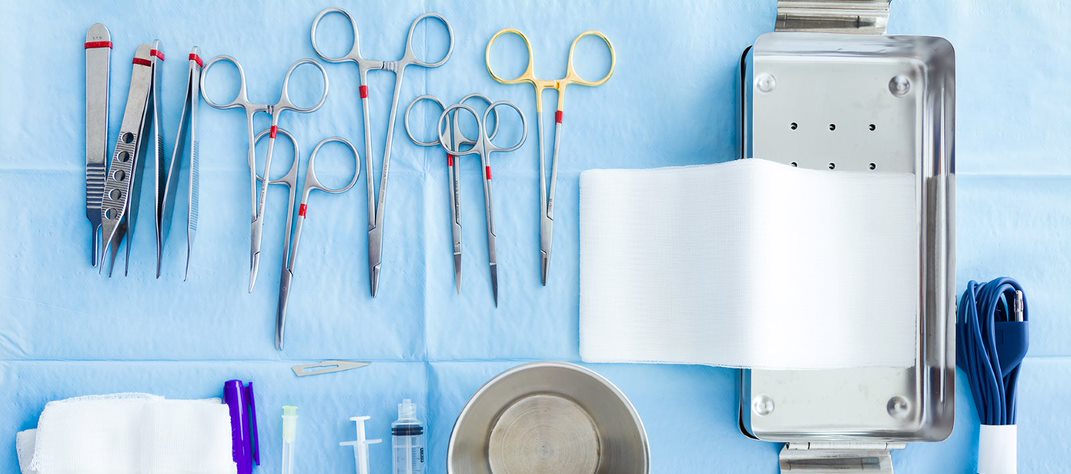
Medical or hospital equipment are used to assist in the diagnosis, monitoring and treatment of patients in a variety of health-care settings. The development of new advanced medical technology makes it easier for a patient to recover from their illness.
Diagnostic equipment: Diagnostic equipment is any device or gadget that is used to diagnose, test, or screen for health issues. This category includes thermometers, sphygmomanometers, stethoscopes, X-Ray, Ultrasound, ECG and MRI machines.
Therapeutic equipment: These are used to treat patients. Patients with various sorts of swelling and wounds, connected to illness states ranging from lymphedema to diabetes, rely on therapeutic medical items to both prevent and heal their wounds.
Surgical instruments: The success of a surgery is dependent on precision, consistency, and the use of high-quality surgical instruments. Surgical instruments come in a variety of shapes and sizes, and they can be classified into groups based on their function like cutting instruments, grasping/holding instruments, haemostatic forceps, retractors, clamps & distractors and accessories & implants.
Durable medical equipment: This long-lasting equipment are able to protect patients from injury, like wheel chair, commodes and raised toilet sheet, walker and power operated vehicles improve the quality of living of the patients.
Biomedical equipment: These analysis tools are used to check the accuracy of various other equipment like oxygen concentrators, ventilator, anaesthesia gas delivery device etc.
Hospitals must be prepared for all type of emergencies. That's why it's critical to have essential or basic medical equipment available at all times in order to provide complete care. There is a standard set of equipment that all hospitals should have ready in order to provide full treatment to patients.
When dealing with emergencies, transporting patients is critical. This is an essential piece of equipment for hospitals to have on hand as patients’ route in and inter department throughout their treatment.
These places are full of germs. Controlling the spread of infection is critical for preventing infection, an autoclave is a must have item for the same purpose. It sterilizes the equipment & instruments by heating at high pressures and high temperatures.
Defibrillators are the devices that restore normal heart rhythm in life-threatening conditions such cardiac arrhythmias or tachycardia and turn out to be lifesaving. They are the necessary tools for which a hospital must constantly have backups.
Basic diagnostic equipment is a must to complete any medical supplies list, these include blood pressure monitor, thermometers, blood test kits, pulse oximeter, stethoscopes, ophthalmoscopes, otoscopes, colposcopes, eye charts, reflex hammer etc.
Anaesthesia machines are designed to deliver a consistent and accurate supply of medicinal gases to a patient in order to maintain a safe level of anaesthesia. Added tools like ventilator, suction unit, and patient-monitoring devices are all included in modern anaesthetic machines.
For minor procedures like cleaning or dressing a wound you require adhesive bandages, antiseptic wipes, cotton wool pads, gauze, hypodermic needles, tweezers etc.
Electrocardiogram (ECG) machines record the electrical activity of the heart over time, allowing health care clinicians to monitor the heart's overall rhythm and detect any irregularities. This is a critical piece of equipment since an irregular heartbeat can indicate serious underlying health issues.
Surgical table is a must have item for a hospital which is essentially required for patient preparation, surgical procedures and recovery.
Blanket and fluid warmers are essential to eliminate post-surgical problems such as perioperative hypothermia, extended hospitalisation and recovery, and an increased risk of infection which can occur if body temperatures are not maintained during surgery.
Surgical/specialised lights are a mandatory part of patient examination and surgical setting to help doctors or surgeons work under adequate lighting conditions.
These are all necessary pieces of hospital equipment keeping which on hand is critical to the operational success of a hospital and the health care provided within it. OxyMed is an established name in the medical equipment suppliers in Dubai-UAE & Delhi/NCR-India, specializing in providing high-quality health care supplies and equipment. We offer medical equipment and supplies at competitive prices to health care professionals across UAE & India. Our name is sought after in the list of medical equipment companies in UAE.